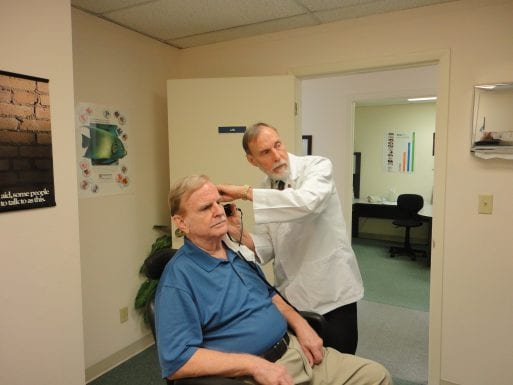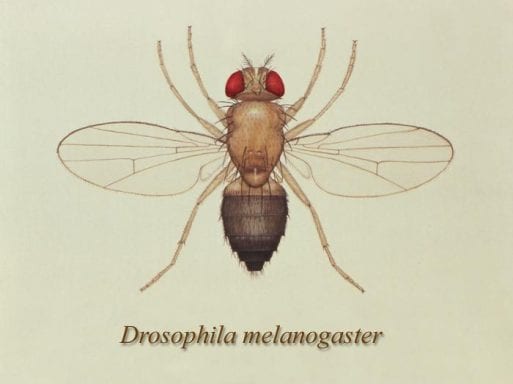
A doctor tests a patient for age-related hearing loss.
Scientists at University College London have made a new gene discovery in fruit flies that has big implications for hearing loss among the elderly. The finding could help develop treatments for age-related hearing loss in humans.
According to a 2016 study published in JAMA Otolaryngology, age is the strongest predictor of hearing loss among adults. In the United States, about 8.5 percent of adults aged 55 to 64 have disabling hearing loss. The rate increases to 25 percent and 50 percent for those aged 65 to 74 and 75 and older, respectively. In the United Kingdom, about 70 percent of people over the age of 70 suffer from a decline of hearing.
Age-related hearing loss doesn’t just diminish one’s ability to hear; if left untreated, it can cause greater social isolation and depression, increase risk of injury, and even be linked to premature death.
The Cause of Age-Related Hearing Impairment
Humans’ eyes and ears are constantly interacting with the outside environment. Because of this, they require a constant flow of metabolic energy.
Experts believe there are more than 150 candidate genes that could be responsible for some hearing loss, but there has been no set solution for utilizing these to develop therapies or treatments.
That is, until a recent study with fruit flies revealed an important gene discovery that seems to promise a way forward in treatment.
The Gene Study With Fruit Flies
Originally published in Scientific Reports, the work involved researchers at the UCL Ear Institute who assessed the common fruit fly (Drosophila melanogaster) and its hearing ability. The reason for using the fruit fly is that its ear is very similar to the ears of humans when considering molecular aspects.

The ears of fruit flies are molecularly similar to those of humans.
Credit: phil.cdc.gov
The goal was to see if an increase in age also related to a decrease in hearing ability in the insect. The researchers utilized advanced biomechanical, neurophysiological and behavioral techniques and found that the antennal ears of the fruit flies do, in fact, show age-related hearing loss. Almost all measures of sensitive hearing declined after 50 days of the expected 70-day lifespan.
The discovery came after the researchers sought out a genetic indicator for age-related hearing impairment. What they found was a new set of transcriptional genes, or “homeostasis genes.” These genes are responsible for the overall sensitivity of the ear.
After the discovery of the new genes, the next step was to manipulate some of them by using certain tools to see if age-related hearing loss could be prevented in the fruit flies. The researchers were able to make the genes either more or less prominent.
The results demonstrated that by manipulating the genes in this particular way, hearing loss for the fruit flies could be successfully treated. These findings could lead to future treatment and help direct clinical research in humans. All of this could very well result in the discovery of brand-new pharmacological or gene-therapeutic strategies. The findings could also lead to drug-discovery projects aimed at quickly developing treatments for age-related hearing loss.
According to Dr. Ralph Holme, executive director of research at Action on Hearing Loss, “We urgently need to find effective treatments able to prevent or slow the loss of hearing as we age … It not only advances our understanding of why hearing declines with age, but importantly also opens the door to the future development of treatments to prevent it.”

 Breakthrough Gene Discovery in Fruit Flies Could Lead to Age-Related Hearing Loss Treatments
Breakthrough Gene Discovery in Fruit Flies Could Lead to Age-Related Hearing Loss Treatments



 How Dare You Die Now!
How Dare You Die Now!
 Debating Medical Aid in Dying
Debating Medical Aid in Dying














